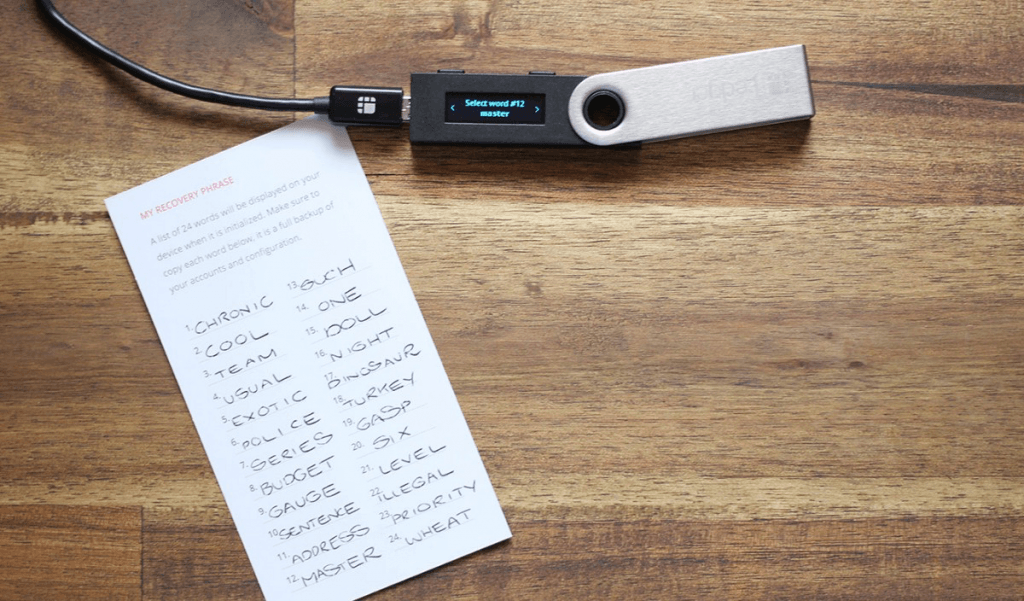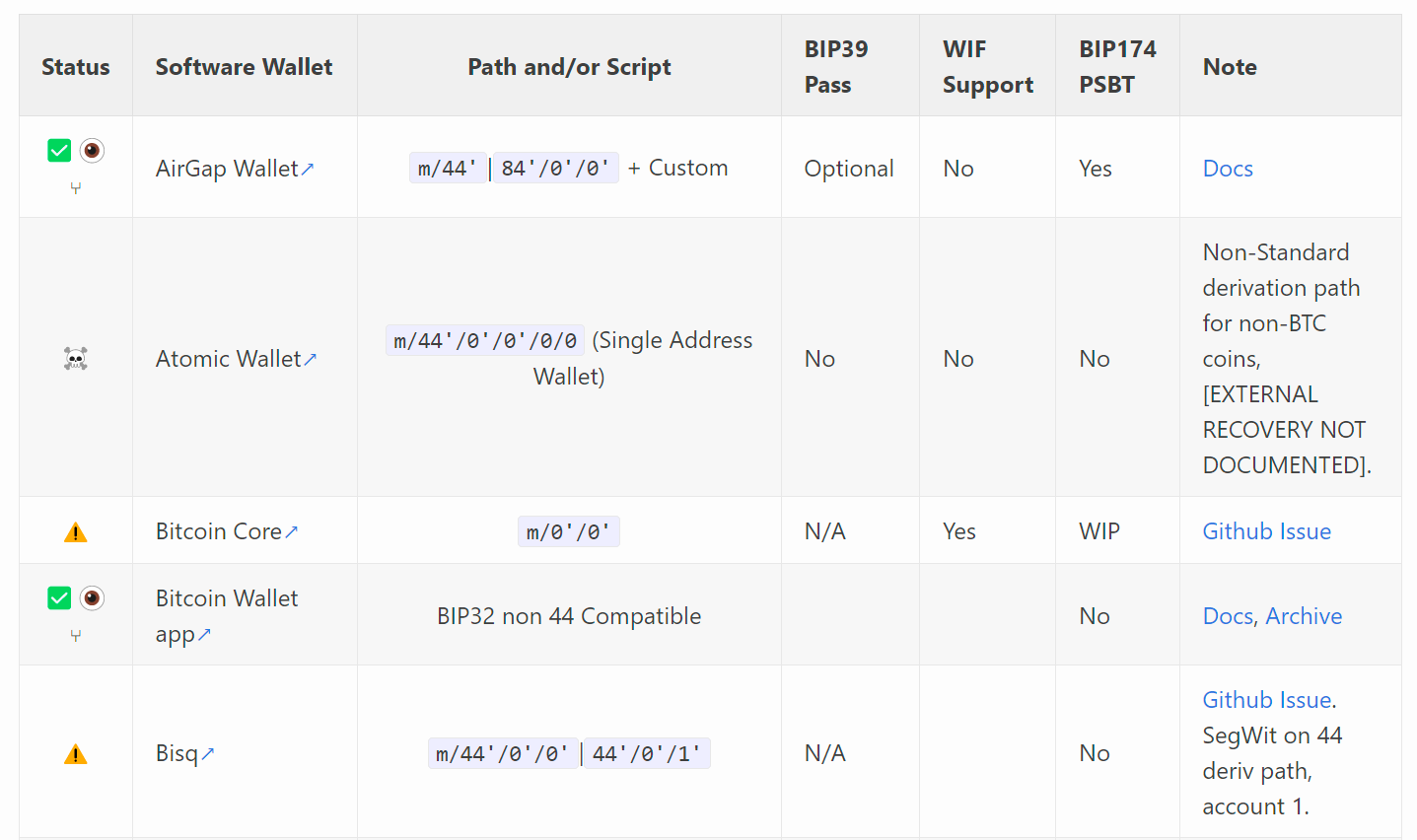 When creating a cryptocurrency wallet, you will be asked to save a list of 12 or 24 words, with which you can restore your crypto assets in case of loss or breakdown of a hardware wallet or a computer with a software crypto wallet. Usually wallet recovery is not a problem, but there are situations when you want to change your hardware wallet for your own personal reasons or because your crypto wallet that you used to use is no longer issued or updated. You might think that your 24-word seed phrase for restoring your wallet seems completely useless now. But it’s not worth panicking and screaming that everything is gone right away, because. there are certain standards for the formation of seed phrases (mnemonic phrase), which are usually followed by developers of cryptocurrency wallets. Therefore, any seed phrase can be made compatible with any crypto wallet through special transformations.
When creating a cryptocurrency wallet, you will be asked to save a list of 12 or 24 words, with which you can restore your crypto assets in case of loss or breakdown of a hardware wallet or a computer with a software crypto wallet. Usually wallet recovery is not a problem, but there are situations when you want to change your hardware wallet for your own personal reasons or because your crypto wallet that you used to use is no longer issued or updated. You might think that your 24-word seed phrase for restoring your wallet seems completely useless now. But it’s not worth panicking and screaming that everything is gone right away, because. there are certain standards for the formation of seed phrases (mnemonic phrase), which are usually followed by developers of cryptocurrency wallets. Therefore, any seed phrase can be made compatible with any crypto wallet through special transformations.
First, let's figure out what a seed phrase is.
As you know, a cryptocurrency wallet consists of a public and private key, where the public key in the usual sense is called the address, and the private key is the password to the wallet. Further, the private key is encrypted and a certain set of letters and symbols is obtained similar to the private key, which is almost impossible to remember, and in the process of writing such a long key it is easy to make a mistake. To make the seed phrase easier to perceive and minimize the number of recording errors, the seed phrase is additionally encrypted with a set of 12 or 24 words (there are options for 13 and 15 words). The list of words is predefined and consists of 2048 words in various languages of the world: English, Japanese, Chinese, Korean, Spanish, French, Italian, Portuguese and Czech. But usually in 90% of cases only one language is used - English. You can get acquainted with the list of 2048 English words used to generate seed phrases at this link https://github.com/bitcoin/bips/blob/master/bip-0039/english.txt
What is BIP39, BIP32, BIP44, BIP48, BIP49, BIP84, BIP144?
BIP39 is the generally accepted standard today for generating seed phrases of 12 or 24 words. You can choose between 12 or 24 words with a BIP39-supporting wallet yourself. This standard also regulates the 2048 words used, which we talked about earlier.
There is also the BIP44 mnemonic phrase standard. This is a special case of BIP39, designed to be compatible with BIP32, where only a 12-word mnemonic phrase is available.
BIP32 is currently considered an obsolete format that has been in use since 2011 (Electrum wallet). A mnemonic phrase of only 12 words is used. It is currently not recommended to use wallets that only support BIP32.
BIP84 and BIP141 used for SegWit bitcoin wallets, backwards compatible with BIP32.
BIP48 is an addition to BIP32, which offers to use a master key (password) suitable for several independent wallets at once. Up to 4294967296 child (private) keys can be stored in the master password already from a specific public address (wallet).
Converting a mnemonic phrase into a private and public key for different wallets.
To restore access to your crypto assets, it may not be enough to know only the seed phrase, because. different wallets may use different derivation paths.
The Derivation Path is a kind of map with which the wallet will find the addresses associated with it in the blockchain. Derivation paths appeared with the advent of the master password in BIP48.
Derivation paths are written as follows: m / Purpose' / Coin Type' / Account' / Change / Address
Example: m/44'/195'/0'/0
It turns out that in order to restore access to your crypto assets, you need to know not only the seed phrase, but also the derivation paths for the applied wallets
The derivation paths for each wallet are specified in its technical specifications along with the supported mnemonic phrase generation standards. To make it a little easier for you to find this important information, you can visit walletsrecovery.org, where hardware and software crypto wallets and their derivation paths are collected in one place.

Then a natural question arises: what to do with all this data?
Next, we need a mnemonic phrase converter or Mnemonic Code Converter.
It will convert your seed phrase from one wallet into a seed phrase for another wallet.
The utility from Ian Coleman will help with this https://github.com/iancoleman/bip39/releases/tag/0.5.4
IMPORTANT: perform all conversions on a local computer without an internet connection. Restart your computer after applying. Or better yet, do everything in a disposable virtual machine.
You can also practice with random seed phrases on the website: iancoleman.io/bip39
You should also be aware that not all crypto wallets adhere to BIP32, BIP39, BIP44, and if you use one of them, then you will not be able to restore access to cryptocurrency on other crypto wallets. The only way out is to send from one address to another while you still have access to such a wallet. One such wallet is Atomic Wallet.
P.S. This article does not aim to thoroughly cover the topic of converting mnemonic phrases for cryptocurrency wallets, but only gives a general idea of the principles of generating seed phrases and how they can be applied in relation to different cryptocurrency wallets.
Conclusion: Use crypto wallets that support BIP39 with a 24-word seed for maximum security, and BIP44 for maximum compatibility with different cryptocurrency wallets.









